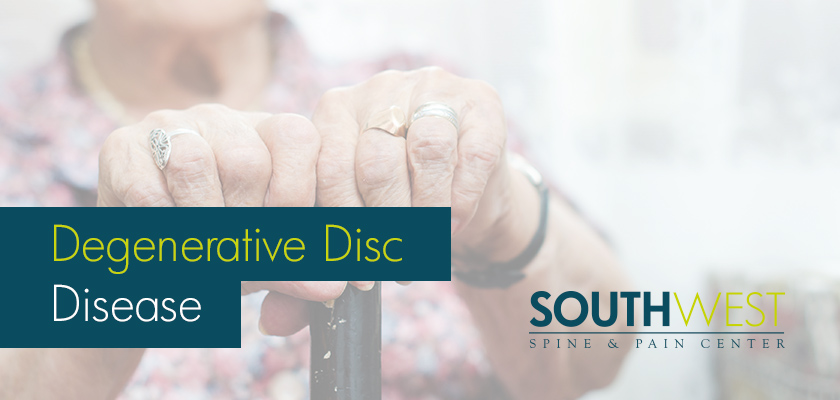
Degenerative disc disease is a condition that causes pain from damaged vertebral discs in the spine. Degeneration of one or more discs is fairly common in aging adults and can hasten from conditions like spinal stenosis, osteoarthritis of the spine, or spondylolisthesis (facet joint degeneration). Unfortunately, this ailment can confuse and/or create unnecessary panic in people because of it’s name. Degenerative disc disease is not actually a “disease,” and contrary to popular belief, this condition can get better over time.
The team at Southwest Spine and Pain Center is here to debunk common myths associated with degenerative disc disease and share what treatment options are available to those suffering from the condition. Keep reading for more information on degenerative disc disease.
What is Degenerative Disc Disease?
We mentioned very briefly what the condition is, but we’ll elaborate to give you a clear understanding of degenerative disc disease. Again, degenerative disc disease is a general term for pain and/or numbness from a damaged or degenerated disc in the spine. Pain usually occurs from inflammation or instability of the annulus (outer ring of the intervertebral disc) wearing down.
What are the symptoms?
Symptoms may include:
- Lower back or neck muscle spasms
- Lower back or neck pain
- Tingling or numbness that radiates down the back and throughout the upper and lower extremities
How is DDD diagnosed?
Degenerative disc disease can be diagnosed by administering a physical examination, reviewing symptoms and patient medical history, and by performing various diagnostic tests. In regards to the physical examination, a physician may tap areas of the leg or arm to test nerve function; test muscle strength for muscle atrophy, twitching or abnormal movement; apply pressure to areas of the back to identify painful areas. Diagnostic testing may include a CT scan, an MRI scan or a discogram.
How is DDD treated?
Depending on the level of pain a patient is experiencing, a physician may recommend nonsteroidal anti-inflammatory drugs (NSAIDs) like ibuprofen or Aleve, prescription pain medication, injections, or a minimally invasive procedure like spinal cord stimulation or kyphoplasty/vertebroplasty. Talk to your Southwest Spine and Pain Center physician about ways to treat your degenerative disc disease.
If chronic pain is impacting your life, don't wait to schedule an appointment at Southwest Spine and Pain Center. With four locations in Utah and growing, the pain management specialists at Southwest Spine and Pain Center are dedicated to helping those who suffer from chronic pain live the life they want to! To schedule an appointment, visit our locations tab!
The advice and information contained in this article is for educational purposes only, and is not intended to replace or counter a physician’s advice or judgment. Please always consult your physician before taking any advice learned here or in any other educational medical material.
©Southwest Spine and Pain Center, 2015
©Medical Marketing Solutions, 2015
